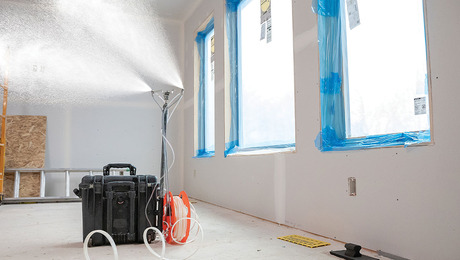*
Is there anyone out there running a contracting business who 1: makes a decent living and 2: doesn’t work 60 hours a week?
I’ve been thinking about this for a while and am trying to find ways to cut down on the time involved in overhead (paperwork, phone calls, bidding, materials procurement, etc.). I’ve also thought about turning down a lot more work, thus changing the model of “bid eveything you can and worry later”, but of course the problem here is the anxiety of the self-employed, which is “If I turn down work, I may lose contacts and not have enough work later” (or something along those lines). I would be interested in hearing from anyone who is trying to deal with a similiar problem.
Lee



















Replies
*
Lee... I was in same boat... buddied up with another contractor... even though i am an employee... i have a say in what goes on in the biz and have pretty much free reign in my position.... was able to cut back the hours, increase the pay, share the burden, and never want for jobs...
think about it...
Eric
*Lee,If you are smart enough to ask yourself these questions you will be smart enough to work out the solutions.I am not a very bright guy ,so it took me about 8years to work out my own solution!My solution works well in a fairly large metropolitan area with a pretty fair X-way system.I don't know if it would work at all in a more rural area,and a really big city might have to many traffic problems etc.Anyway,here is what I did.I realized I could not "be all things to all people"I could not be a G.C.and meet my goals so I specialized in 1 aspect of the business and concentrated on getting above market rates on that specialty.I no longer directly employ anyone but I do use some subs from time to time.About 85% of the time I work aloneAnd I am paid Quite a bit over the market rate.I don't do much work in new construction because I can get at least 4 times the market rate for new construction by working in older neighborhoods and my customers are delighted to pay.Not all customers ,just my customers.I would estimate that price is the determining factor with about 80% of potential customers.I don't even try to get those jobs because you can't win the lowest price game,someone is always willing to do it for less.Maybe 10% of potential customers want the highest quality work available and money is no object.Believe it or not I don't really want those customers either,they can be VERY hard to deal with.That leaves the last 10%,my bread and butter.My customers have a project or a problem that the large contractors will not touch because it is to small for their crews to handle.Often it requires a level of skill that the low price boys do not have.Many times the project has been attempted several times by various low price boys with un-satisfactory results.When I am on the scene I approach the work from a sort of "old world craftsmanship"method.There are no short cuts.I tell the customer exactly what work I will do,in detail,Exactly how much it will cost(with a hefty built in contingency fund),how long the work will take,etc.Then I deliver what I promised.The customers are delighted to pay my rates.If the job is less than $800-1000 I take no deposit but get paid 100% upon completion.If the job is over $1000 I get 50% down,balance upon copletion.If for some reason I can't start the job for several weeks I don't require the deposit untill 5 days before work is to start.Most of my jobs take 1 day or less.If a potential job is to big for me to do alone,I either turn it down or I Sub it to a like minded contractor and I do a lot of on site supervision.I use the same sub every time and we have a good relationship.My trade is fairly weather sensitive so I can only work about 8 months out of the year.I average about 4 days of billable work a week , and on those days I am often home by 1:00,rarely do I get home after 3;30-4:00.With this work schedule you can see I have only 130-140 days a year to earn a living,and since I want my family to enjoy a reasonably middle class life-style I am fairly Mercenary in my pricing.I do pay for some advertising but this cost is more than offset by the profits from the jobs I sub out.I am happy,my family is happy, the customers are happy,and the sub is happy.By the way,you would not believe how often customers tell me when they are handing me the check: "you know you are the only one we could get to even look at this job" or "we had lower bids but we really liked the way you handled yourself and spelled everything out" or "you really seemed like you knew what you were doing" Now when you are bidding in a situation like that you can afford to be a bit Mercenary.I am not the "best",The fastest or the most customer service oriented but I do try to keep very high standards in all of those areas.Sorry I was so long winded and my computer skills so limited. Best wishes,Steve
*
1 raise your rates
2 QUIT BIDDING
3work smart - not hard!
4niche , find one!
5 yes you will lose a few customers
6 BUT. you will also pickup some new ones who will pay enough to make up the difference!
7 enjoy your work and do the best quality in the area!
8 spend more time with your family ! the greatest reward of all!!
9watch your busineesss grow!
10 laugh all the way to the bank!!!
ive done it for the last 5 years afyter 15 years of daylite to dark!!
*
Steve, well put. There was a time I wanted to be the biggest contractor in the west. I started searching for the right guys I knew I'd need. I tried to coax them along to towards the vision I had. Then I woke up.
I too realized big is not better. Took me awhile, but now I know. What you have done is what I call "niche marketing". You have found your place, ain't it grand?
I no longer have fulltime employees, no, not one, but I do have a tight network of skilled subs I can count on. Mostly, they are like minded in wanting to do high level work. We work together from time to time, flipping jobs back and forth, teaming up on some jobs, working alone on most.
Screw the low bidder--he has a choke hold on himself, doesn't know it, and is bringing the market down with him. Couldn't ever beat 'em, so I changed markets. (I'll NEVER join 'em)
The state I work in (CA) does not allow me to garnish such a large deposit (max. 10%) before work commences, but I beat this by letting it be known that delivery of materials constitutes commencement of work. This is fair to all because I usually start work very soon after delivery. I don't want materials laying about the job unattended.
I still run into the adversarial customer, the one who waffles on payment, or tries to negotiate down on my labor after the job has started. If a subsequent conversation does not resolve this I have developed ways to deal with this. One is to say I will be taking a couple of days off from their job. The money they thought they were going to save is eaten up by non-performance. Unsavory, I know, but they need to realize I'm running a business.
I try to be fair to all (my back hurts from bending over backwards so often) and I wish I could allow myself to raise my prices. But there is no joy--well, okay, the money--comparable to gazing upon a finished project well done.
As for the customer's comments that you posted, have you asked for a written recommendation to put in your portfolio?
*
Hey guys - I appreciate the comments - hope you'll keep them coming. So what about the "overhead"?
*Lee, the best way to cut Time used for calls, material procurement and help provide a family life is a cell phone. I use a Nextel pakage with the radio. Freinds that I swap time equipment and info with are on the network also. There is no air time cost. we even trade traffic tips ( more reliable than the radio). I also use it as my business line. I DON'T give out my home #. If you do you're crazy. Use the phone to call suppliers and have them deliver materials. It may up the material cost a little but what you gain in productivity is enormous. Tell your sales reps (call them first) to meet you where ever it is convienient for you and let them do their own take offs. Get rid of the sales reps / suppliers that won't. If they know thier proudct they can do the take off faster (with good info) and you need a price from theem any way.mine your customers for referals. There is no shame in self promotion, only gold. I tell my customers I rely on refferals. It is amazing how well this simple stsatement works. Also referels are more likely to be sold first try. A word of warning on referels, If you did'nt like working for them don't ask for any. Birds of a feather seems to be true. On that note, if you get a bad feeling any time before starting the job, consider getting rid of it.Ulcers and low pay aren't worth it.hope this helps
*
Lee,I think your getting some good help here and I am very happy to see that there are others out there with a similar approach.Be aware that a lot of what you read in business texts and periodicals will be entirely counter productive to your goals of more money/more free time/and more craftsmanship.ro rehm comment above about the use of the cell phone is excellent.Remember I told you that I am not that bright of a guy? Well I got a cell phone a couple of years ago just so my kids school could get ahold of me on the job in event of an emergency. It is only in the last 6-8 months that I have begun to fully realize its' potential.I put my business line on call forwarding when I leave the "office" and answer my cell phone all day.This saves a ton of Phone Tag and lets me screen clients on their first call.Also a lot of potential customers will not leave a message on a machine so the call forwarding to the cell phone gets you a lot more work requests.Previous comments on NOT taking referals from hard to deal with customers are also right on.THE JOBS YOU DON'T GET ARE MORE IMPORTANT TO YOUR BOTTOM LINE AND YOUR PEACE OF MIND THAN THE JOBS YOU DO GET.Know when to say NO.As far as your questions about overhead, it is hard to be specific if we don't know exactly what type of business you are in.In general I try to keep my equipment needs pretty simple But I usually try to buy the best I can find.I do invest in "modern" equipment like Air Comps,Air Nailers,Cel Phones etc. because they pay for themselves VERY quickly in additional free time and additional profits.Just Don't confuse Wants with Needs.(there is a topic for another conversation!)For the type of business I run I have found this computer to be completly un needed.I bought it planning to computerize my bookkeeping but I found it needlessly complicated things.I use the Dome Simplified Weekly Bookkeeping Record I buy at Office Max.It is IDIOT proof.It takes me about 10 minutes a week to handle all my book keeping With this system.If I had more computer skills some of the computer programs I demo'd might work better but my present system is more than adequate.If you have specific questions ask away.One last thing for today,If you haven't already,get a dedicated business phone line.Do not try to operate off of your home phone.Pay the extra $35/month for the 2nd line.Set a arbitrary time like 8:00pm and don't answer the phone after that time.Your blood pressure will drop 50 points!Good Luck and if you have more questions I am sure someone out here can help you.
*Steve, I agree whole heartily with your business plan. I am curious, though: what excactly are you specializing in. Your description read like a mystery novel, and left me dripping with the big question! What in the hell do you do?Blue, chuckling and curious in MI
*Excellent advice Ro Rhem! I like the tip about asking for referals. So simple, yet so effective!Blue
*Stephen Hit the nail on the head with wants and needs. As a small contractor I spend lots of time in the bid mode and have found out that my first "gut" price is pretty close. When dealing with new people I try to get a budget on what they want and go from there and give them a ball park on price before spending hours on pricing. I have sometimes given what I call a build your own bid on some things. Like a bid for a bump out porch I just did. Older couple who were unsure what they wanted. Had a concrete slab off the back that would work and wanted to close it in. Gave them the option of just a roof and screen or more of a three season type or a full living space. Tile floor, wood over drywall ect...ect... differant types of ideas that we had done with a price for those items. All those picture I took of differant jobs we did help out now. To help save time I jointed the 90's and went to a real computer with cad payroll bidding and cost tracking. Now I can fax, email and quickly send out stuff all from the same place. Have just updated the phone lines to handle this. Spend one day a week in the office keeping things up to date and the rest where I'm needed.(Sometimes to some of my employees dismay never was a 1st class caulk man,have one now who is) Then new people are hired I spend time working with them in the field to see if they are as good as they say. The hardest thing for me is admitting that some of my guy's are as good as me with their tools. We have worked hard to get where we are and don't want to be the biggest just the best at what we do. As far as bidding everthing that comes along I bid to fit the work schedule. Tring to keep everone busy is hard to do and sometimes you bid ten jobs and get nothing. Then you bid ten and get them all working your a** off tring to get caught up. Have never found that magic touch that allows you to make a schedule and have it work out. A retired remoder told me once that you bid ten and get one. After working for the other guy's for so long I enjoy what I do most of the time. Sometimes I have to step back and remember to breath and enjoy spending time with my wife. Take a hour one day and surprize her by taking her out to lunch. Better then flowers. Besides I get to bug all those office nerds then I stop by her office.
*Blue Eyed Devil, I am a very proud member of the lowly roofing &spouting trade.I stopped trying to expand as a G.C. and shrank back down to a very narrow specialty(leaving behind virtualy all the headaches and hassels).Even within my trade I specialize and there are definite types of work I will not take.I know I sound fanatical at times,insisting that I have the best system, but it really works well for me and I am sure it could work just as well for a lot of other guys.By the way I am pretty sure it would work for bricklaying,concrete,electrical or just about any trade.I think the trick would be to really have a good comand of your trade and then focus on a few un-glamourous but very lucrative specialties.In my area if you can find someone it will cost about $1000 to have a chimney dismantled down to the roofline(lets say about 3-4 feet) and then re-built.I have subbed these out and the last guy used to do this with a helper in about 3-4 hours.Even subtracting his materials I think thats pretty good money for a mornings work.I know another guy that pours garage floors and small patios,walks,stoops,driveway aprons etc.Nothing really big ,but he seems to be doing pretty good.Now here is a sub-specialty that I am curious about.90% of the time,when I go to a customers house and ring the door bell,nothing happens cause the thing does not work.Could not a skilled electrician fix this profitably?I think the marketing would be key.None of these things are very glamourous but we all do very well AND we have plenty of afternoons for fishing,golf,reading,and my personal favorite BASEBALL with my sons.I would really like to hear how other guys arrange their"systems" P.S. Lest anyone think we are just exceptionaly lazy guys living a hand to mouth existence,I would like to say that most of the guys who work this way that I know live a typical middle class life(own their own homes,drive late model vehicles,invest for retirement etc.)Nobody is rolling in dough,but they are pretty comfortable.See you at the ballpark on opening day,Stephen
*Ro - What is a Nextel package w/radio? I have a cell phone but where I live(rural hilly territory) it's mostly useless, doesn't get a signal much of the time. I have a laptop which I bring to the job, fax orders to suppliers(they love it, so much better than taking a list over the phone what with the noise and interruptions). I send it to them then call a few minutes later to see if they have questions. I have them deliver to the job when practical, otherwise my shop.I agree that referrals are the best source. I am an electrical contractor in a small town so everyone knows everyone elses business pretty much anyway. I should probably just pull my ads out of the local newspapers.
*Here's a thought. If you are going to be a successful employer, and make money, you have to have margin. That comes from creating preceived value, and getting people to work for you for less than they are worth. I would suggest that instead of building for someone else, build rentals for yourself. Now you have a business that can use capital, and pays you a rental income that does not have 15% taken out for FICA, and Medicare. As I read this thread, most of you have no repeat business, so after every nail is placed, you have to find another job. I am not sure, but I think that this is hopeless. I have done this on a small scale, and you can make a little over 9% return on your capital. This is real cash on a conservative basis. If there is inflation in rents, the return will go up with each year. Yes, you will get bad tenants once in a while, but you guys are being stuck with bad jobs once in a while. It is a ball to build, but I have looked at as a side business, and while you may have some good years, it seems difficult to build a good life on it. Just a thought. P.S. I have hired "subs" and moonlighters do build several projects for me. They have gotten their start, I have gotten my work below market, and when they moved up in pirce, I looked for someone new. There is no arroagance in this post, just an observation on how business seems to work.
*Lee, Nextel is a cell phone company that also offers the "buissiness" net work wich is a radio system to subscribers. You may not have it in your area yet. I live and work in central Ohio and have used the phone in most of eastern and northern ohio, southern michigan, baltimore, denver and the carolina's. i didn't turn it on in w. virginia, v& virginia, it was a vacation. As mmuch as I hate to say it, you might consider looking to a larger market if there is one within easy reach. I live 20 minutes North of Columbus. I don't do work in my town or any where I can run into customers at the grocery store. I am not ashamed of my work or my business practices. It's just that this is stressful enough without turning the corner and finding an impatient customer that cannot understatnd the concept of waitingfor materiaals, their place on the list or wants to talk about making changes. It gives real peace of mind to be able to go home & relax.One other thing, it's Rob, not ro. Blame it on clumsy fingers fatigue & Molson's
*That's funny Dennis! The millionaires that I work for don't try to get me to work for less than I'm worth!You obviously are only focusing on price, not value.The build to rent idea seems like a reasonable proposal, but the rest of your dialogue is questionable.Blue"The more people I meet, the more I like my dog."
*Good for you stephen. I don't think any job is lowly. I agree that niche marketing is a vey good way to go.I'm currently considering several possibilities myself. I already would have been doing one thing or another, but a miracle rookie hired on, and now I'm developing him as my replacement.There really are a lot of possible niche markets. One that occured to me was the changing of bulbs in chandeliers that hang in two story foyers. Around here they are in every suburban house. I would clean and replace all the bulbs on a regular basis.The idea occurred to me, when my partner and I, were conversing with a couple of ladies that had offered us some ice water, on a hot day. We ended up talking about chandaliers, and the first lady mentioned that she "never turns it on any more cause there were only a few bulbs left", and she wanted to save them for when company came. The other lady said "me too"! That's when the light bulb went off in my head.Maybe some day...Blue
*Boy, rough life in the 'burbs!Here we have the more ordinary problems of flooded basements and disintegrating front steps (wood and brick). (Our house came with concrete -- ugly but bulletproof.) I think a fast stairbuilder could do very well -- line up 10 contracts and knock 'em off assembly-line style.
*Ah, you are too smart to work for me. But, if the economy in general is growing at 2% and he is making 9 to 15%, where do you think the additional 7 to 13% comes from? One of the keys to being a good boss is to get people to feel good while they are making you money. Maybe he is smart enough to have you make more for him than yourself. As for price, I focus more on profit and expected present value of future cash flows vs. net cost. For all of us who make our livings with our hands, this is a difficult concept both in theory and personal values. The best carpenters technically are probably artists at heart. This is a hobby for me, one which I love, but listening to all of you and having built a few things myself, I recognize what a difficult business it truly is. Still, the a number of the carpenters and builders around here who have do well have built rentals, be they commercial, residential, or storage. Some of those who did so had earlier gone bust trying to build for others. Dennis"I find my dog okay, but I enjoy people more."P.S. This is my last post on this subject as it takes away from the fun of building. Pity what is enjoyable isn't always as profitable or free from frustration as we would like.
*DENNIS, you have some good points, and around here a lot of the older guys did invest in rental property as their retirement plan. Of course that was before the madness of recent stock market returns.Also the nature of the work does tend to limit repeat business if you have done the job right.most repeat oportunities involve todays roof repair and frank evaluation of overall roof condition evolving into complete roof replacement 3-4 years later. MR BLUE. How about this idea?I see lawn care companies cut lawns on the same street---2 today ,1 tomorrow, 3 on friday etc. Why doesn't the same guy cut all 5 in one trip the same day? Also, am I the last guy on the planet who makes his kids mow the lawn?My kids started when they were about 6 and its been years since I had to remind my wife to get out there and cut it. Now where did I leave that remote? Stephen.
*andrew,A friend of mine is a stair builder for a large millwork operation in the city. He specializes in open stairs, stain grade. He averages 22 minutes per riser! Can you imagine how quickly a person can make pressure treated stairs with pre-cut stringers?-Rob
*Niche market is indeed the key. The examples are everywhere from industrial to residential. I am talking about everything from hydraulics and pneumatics to gear cutting to vacuum tube repair to piano restoration. But how do you identify current or potential future niche markets? It seems to me once you identify a current market the cat is out of the bag. I wish my fingers could stand telling you two of the examples where people literally fell into markets that allow clearing 6 figures. One is even world wide!! So maybe we ought to discuss potential future niche markets. One of the mentioned above started out by collecting things that industry was throwing away. Maybe the secret is really in the dumpster, for more than one reason!!-Rob
*Rob, one must'nt create a new market, but only find it. Here is my example.Many contractors advertise "No job too small", right? So how come there is many a small job undone? The truth is most of your competition are not geared for the small job. Oh, sure, they can do the work, but it costs them in time. So, either they get into the charity business or stick to bigger, more defined, profitable jobs.This is where I come in. Think of it as slipping in between the cracks. The jobs are there, they just need to be mined. To be most successful in a given market, one needs to be responsive to that market. One, soon enough, develops a sense of what is going on within a market. This means you get the jump on any competition. This often leads to increased market share and profitablity.
*Interesting post Dennis. It sounds like a fair amount more work to me, headaches and such, but then I tend not to think big about business. I mentioned earlier that I'm an electrcial contractor, thus I do get a lot of repeat customers, especially in the commercial market. Of course as a sub I get a lot of repeat work from various G.C's. This is part of the problem - my customer base has grown large enough that I can't always handle the demand when my repeats need something done, and when it is a restaurant adding new equipment in a kitchen or something like that they want it done right away. Good high-paying work, but it still takes time.
*A niche-marketing idea from my wife: Start a business that clears up those hard-to-finish punch lists at the end of a job. Put a (high) price on the list, assume the headaches, and off you go.For what it's worth
*Lee, your wife has a great idea except...I guarantee you'll be the guy with the most tools on the job, you'll use them occasionally, you'll be trying to correct someone elses work, and you'll get all the blame.
*Rob - No kidding about the impatient customers on the streetcorner. They've made me feel guilty for going to a movie on a Saturday afternoon when I'm behind (their perceived) schedule on their project...It's a suggestion which I will think about.
*Bill - It sounds like you're busy but you have some control over your work and enjoy it most of the time. That's a pretty good place to be! I like your suggestion about surprising the wife with lunch.Realistically though, how do you handle the work crush when too much comes in at once? Do you just turn them down? And another aspect to that is, how do you deal with the scheduling problems that so often occur when the customer comes up with significant change orders and extras? I find myself often spending 25% or 30% more time than I had allowed because of this stuff and jobs are already scheduled back to back, or worse yet, they want a change which requires a return trip later on when the additional materials(or whatever) arrive. This can also slow the whole job down, which creates its' own problems. I haven't quite got a handle on this . I suppose the answer in part is in the question, allow 25-30% more time when I make my schedule....
*Lee to late the cat is out of the bag on the punch list idea. I have three crews who do punch out and touch up on commerical jobs. These have allowed us to bid and work on jobs that were out of reach before. We do most of the doors and hardware for one major builder in the washington metro area. Have added as a client a cabnet company from out of town for all of there local work. The value of this work is these companies will seek you out if you can provide good work and no come backs.
*Oh no not the pre-cut stringers!!!!!!!!!! Sorry guy's have NEVER seen a case where those things worked out. A good carp can layout as fast as you can scratch your head tring to make those things work. Now if I can just figure out how to work this framing square................................LOLb SOME OF MY BEST PAYING JOBS CAME FROM HOME DEPOT DIY'S
*I cut my own stringers (also called carriages or horses or diagonal thingies? regional thing) for my very first stairs, they work great. I suppose precut stringers are OK if you can control where the top and bottom landings are, like on a deck.Underscore GOOD carpenter. The math is not obvious and it's pretty hard to fudge it after the stringer is cut! Mine let down on uneven & sloping ground, getting me really confused as I chased that 3/8" maximum deviation thing in the layout. But they came out fine -- after about 4 hours of head scratching! Lots of bad stairs around here.A Home Depot DIY & cheapskate, Andrew (well, actually my materials came from a building supply -- HD's pt looked awful. but i did buy the Skil at HD...)
*Rich, you are absolutely right about the possibilities of the small job market. The profits per hour can be obscene if you confine yourself to your own trade specialty. also it is amazing haw the small jobs that no one else would bid morph into something not so small.Got to avoid the insulting "handyman " tag and stick to your own trade though. Flying under the radar, Stephen.
*
Is there anyone out there running a contracting business who 1: makes a decent living and 2: doesn't work 60 hours a week?
I've been thinking about this for a while and am trying to find ways to cut down on the time involved in overhead (paperwork, phone calls, bidding, materials procurement, etc.). I've also thought about turning down a lot more work, thus changing the model of "bid eveything you can and worry later", but of course the problem here is the anxiety of the self-employed, which is "If I turn down work, I may lose contacts and not have enough work later" (or something along those lines). I would be interested in hearing from anyone who is trying to deal with a similiar problem.
Lee